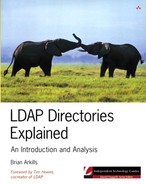M. Smith, “A Simple LDAP Change Notification Mechanism,” INTERNET-DRAFT <draft-ietf-ldapext-psearch-01.txt>, August 1998.
http://www.ietf.org/proceedings/98dec/I-D/draft-ietf-ldapext-psearch-01.txt
M. Wahl, “LDAPv3 Triggered Search Control,” INTERNET-DRAFT <draft-ietf-ldapext-trigger-01.txt>, August 1998.
http://www.uni.torun.pl/~mgw/internet-drafts/draft-ietf-ldapext-trigger-01.txt
M. Armijo, “Microsoft LDAP Control for Directory Synchronization,” INTERNET-DRAFT <draft-armijo-ldap-dirsync-00.txt>, August 1999.
http://sunsite.ics.forth.gr/pub/systools/internet-drafts/draft-armijo-ldap-dirsync-00.txt
M. Smith, “LDAP Client Update Protocol,” INTERNET-DRAFT <draft-ietf-ldup-lcup-01.txt>, June 2001.
http://www.ietf.org/internet-drafts/draft-ietf-ldup-lcup-01.txt
Table A-2 lists the functions in the C language API for LDAP.
Table A-2. LDAP API functions
Function | Description |
|---|---|
ldap_open() ldap_bind() ldap_bind_s() ldap_simple_bind() ldap_simple_bind_s() ldap_kerberos_bind() | Opens a connection to the LDAP server. Returns a connection handle that is used by all other function calls based on this connection. |
ldap_kerberos_bind_s() | Used to authenticate to the directory via the methods described by the function name. |
ldap_unbind() ldap_search() ldap_search_s() | Unbinds and closes the connection. |
ldap_search_s() ldap_modify() | Searches the directory. The _s version works synchronously, but has a time limit parameter. |
ldap_modify_s() ldap_modrdn() | Modifies an entry. |
ldap_modrdn_s() ldap_add() | Changes the RDN of an entry. |
ldap_add_s() ldap_delete() | Adds an entry. |
ldap_delete_s() | Deletes an entry. |
ldap_abandon() | Abandons the operation in progress (in other words, the synchronous operation in progress). |
ldap_result() | Reads LDAPMessage structure for an asynchronous operation. |
ldap_msgfree() | Frees the memory space from the LDAPMessage structure from a previous ldap_result(), ldap_search_s(), or ldap_search_s(). |
ldap_result2error() | Converts the LDAPMessage structure into more usable error codes. |
ldap_err2string() | Converts a numeric error code into a descriptive error string. |
ldap_perror() ldap_first_entry() ldap_next_entry() | Prints the error message. |
ldap_count_entries() ldap_first_attribute() | Retrieves entries from the LDAPMessage structure in an orderly fashion. |
ldap_next_attribute() ldap_get_values() | Retrieves attributes in an orderly fashion from an entry in the LDAPMessage structure. |
ldap_get_values_len() ldap_count_values() | Retrieves an attribute value. Non _len version used for nonbinary string data only. |
ldap_count_values_len() ldap_value_free() | Counts the values returned by the two functions above. |
ldap_value_free_len() | Frees memory space used by the attribute values returned by the functions above. |
ldap_get_dn() | Gets the DN of an entry specified in the LDAPMessage structure. |
ldap_explode_dn() | Separates the DN returned by the function above into an array of RDNs. |
ldap_dn2ufn() | Converts the DN returned by the function above into a user-friendly format. |
